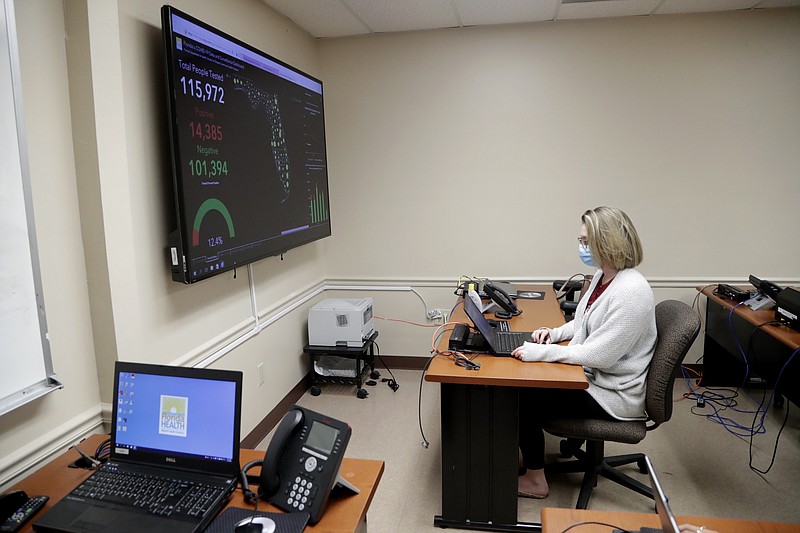ATLANTA (AP) - As state after state begins to reopen, local health departments charged with tracking down everyone who has been in close contact with those who test positive for the new coronavirus are still scrambling to hire the number of people they need to do the job.
They are often hundreds - even thousands - of people short of targets for their contact tracing programs. Public health experts have consistently said robust programs to test more people and trace their contacts are needed for states to safely reboot their economies and prevent a resurgence of the virus.
Cook County, Illinois, has just 29 contact tracers serving 2.5 million people living in suburban communities around Chicago. Los Angeles County, which at more than 10 million people has a population slightly greater than Michigan, has just 400 of the estimated 6,000 contact tracers it will need under California's criteria for a broader reopening.
With 2.7 million residents and roughly 100-300 new COVID-19 cases a day, Miami-Dade County has 175 people tracking down people who were potentially exposed to the virus.
"The whole point of the lockdown was to buy time to have a better way to keep numbers down," said Jeremy Konyndyk, who led the humanitarian response to the Ebola outbreak in West Africa during the Obama administration. "And that's why so many of us are screaming ourselves hoarse about testing and tracing."
Public health experts said contact tracing systems should be in place before cases become widespread so every new infection can be tracked and the person's contacts identified, tested and isolated from the rest of the community.
Until recently, there had been scant federal guidance on what contact tracing should look like, and there is still no coordinated federal strategy. While other countries are taking a national approach to contact tracing, the U.S. is leaving it to states to devise their own programs.
The result has been a patchwork of efforts. An AP review in late April found little consensus among states on basic questions such as how many investigators are needed.
Officials in Cook County, which has the highest number of cases in Illinois outside of Chicago, have said they need at least 200 additional contact tracers and as many as 400 to supplement the work of the 29 currently on staff. Illinois has maintained a statewide stay-at-home order since late March, and Gov. J.B. Pritzker has said the state needs a "massive statewide contact tracing operation."
"The county cannot open safely if additional contact tracers cannot be hired in a timely manner," said Hanna Kite, spokeswoman for the county health department.
On Monday, Miami-Dade County will begin to allow restaurants and stores to resume limited operations, joining the rest of Florida in an initial reopening. It's unclear when the county - the state's most populous and by far hardest-hit by COVID-19 - plans to bring on more contact tracers to assist the 175 staffers doing the work now.
"In Miami, we need definitely more than we have, but so far we have been able to manage the amount of cases that we have to maintain a balanced activity in terms of contacting all the positive cases," said Dr. Alvaro Mejia-Echeverry, a state epidemiologist for the county.
Contact tracing was one of the "core state preparedness responsibilities" outlined in the White House guidelines for reopening the country, but governors have been pressing ahead with lifting restrictions without having comprehensive programs in place.
Hall County, which has more than 200,000 residents and the second-highest rate of coronavirus cases in Georgia, has 30-40 contact tracers assigned to the local public health district, which also serves a dozen neighboring counties. It hopes to receive an additional 30 from the state.

